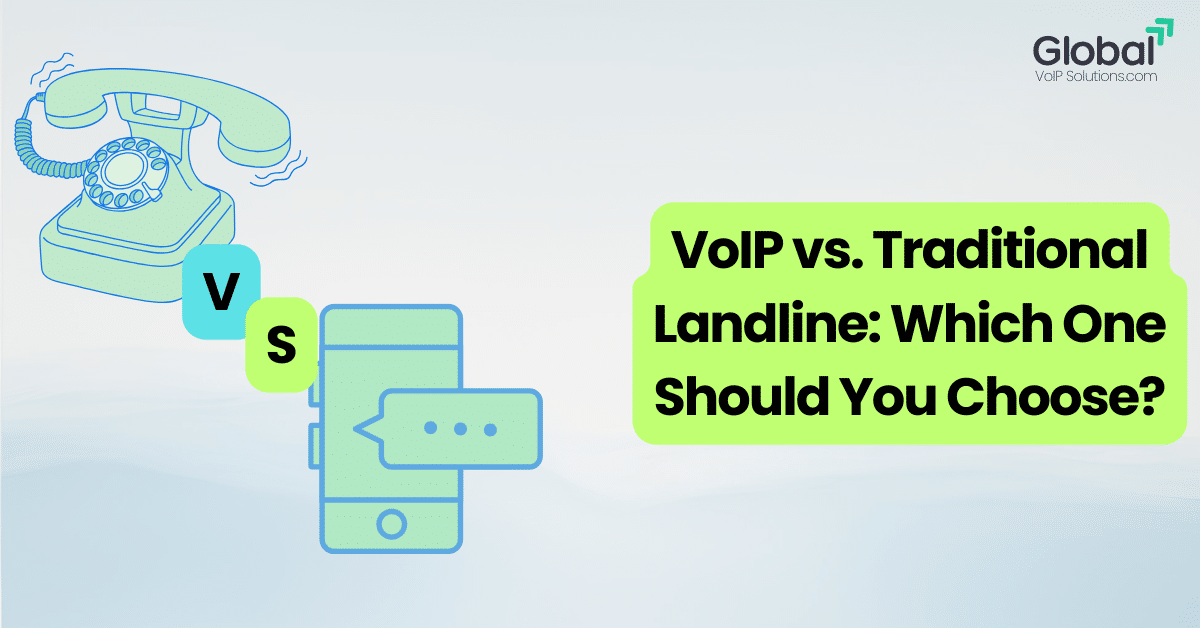Introduction
Are you tired of paying high monthly fees for your traditional landline service? Or maybe you’re unsure if switching to VoIP (Voice over Internet Protocol) is the right move for you. The debate between VoIP and traditional phone lines has grown more important as technology evolves and new options become available. Understanding the key differences can help you make a smart decision based on your needs, budget, and usage patterns.
In this post, we’ll explore the benefits and drawbacks of both VoIP and traditional landline services, helping you determine which option is best for your home or business. Let’s dive into the VoIP vs. traditional phone line debate!
1. What is VoIP?
VoIP (Voice over Internet Protocol) is a technology that allows you to make voice calls over the internet rather than through traditional phone lines. Instead of using analog signals, VoIP converts your voice into digital data, sending it over the internet to your recipient’s device.
- Brief History: VoIP technology has been around since the 1990s but has gained traction in recent years due to improvements in internet infrastructure and the need for cost-effective communication solutions.
- How VoIP Works: VoIP calls are made by connecting to the internet, either through a wired or wireless connection. Popular services include Skype, Zoom, and many business-focused platforms like RingCentral and Zoom Phone.
- Key Benefits:
- Cost-Effective: VoIP is generally cheaper than traditional phone services, especially for long-distance or international calls.
- Scalability: It’s easier to scale VoIP services, making them perfect for growing businesses.
- Flexibility: You can use VoIP on a variety of devices, including smartphones, computers, and specialized VoIP phones.
2. What is a Traditional Landline?
A traditional landline is the classic telephone service that relies on physical wires to connect your phone to a telephone network. This system uses analog signals transmitted through copper wires or fiber optics to make and receive calls.
- How Landlines Work: The signal is sent through copper or fiber optic cables that connect your home or office to a telephone exchange. This system is simple but can be costly to maintain.
- Key Benefits:
- Reliability: Landlines are extremely reliable, especially during power outages or in areas with poor internet connectivity.
- Simplicity: The setup for a landline is straightforward and doesn’t require an internet connection.
However, landlines come with limitations:
- Higher Costs: Monthly fees for landlines are often higher compared to VoIP services.
- Limited Features: Traditional landlines lack the advanced features offered by VoIP, such as voicemail-to-email, video calls, and call forwarding.
3. VoIP vs. Traditional Landline: Key Differences
Let’s break down the main differences between VoIP and traditional phone lines:
Cost Comparison
- VoIP: Typically lower monthly fees, with many providers offering unlimited local and long-distance calling for a flat rate.
- Landline: Higher installation and monthly fees, especially for long-distance calls. International calling can be expensive.
Call Quality
- VoIP: Call quality depends on the speed and reliability of your internet connection. If your internet is unstable, you might experience dropped calls or poor sound quality.
- Landline: Consistently reliable call quality, especially in terms of sound clarity, since the signal doesn’t depend on the internet.
Flexibility & Features
- VoIP: Offers many advanced features such as video calls, voicemail-to-email, mobile apps, and integration with other business tools.
- Landline: Basic features like caller ID and voicemail, but lacks the advanced options available in VoIP systems.
Setup & Installation
- VoIP: Typically easy to install with minimal hardware required. You’ll only need an internet connection, and setup can often be done by the user.
- Landline: Installation may require a technician to set up physical connections, and it may take longer to get everything up and running.
Reliability
- VoIP: Relies on an internet connection, meaning service may be interrupted if your internet goes down.
- Landline: Reliable even during power outages, as it doesn’t depend on electricity or the internet.
4. Pros and Cons of VoIP
Pros:
- Lower Costs: VoIP services are usually cheaper, especially for international and long-distance calls.
- Advanced Features: Includes features like video calling, call forwarding, voicemail-to-email, and more.
- Portability: As long as you have an internet connection, you can make calls from anywhere using your VoIP number.
- Scalability: Easily add additional lines or features as your business or needs grow.
Cons:
- Internet Dependency: You need a stable internet connection for reliable service. If your internet goes down, so does your phone service.
- Power Outages: VoIP doesn’t work during power outages unless you have backup power solutions in place.
- Call Quality Issues: If your internet speed is slow, VoIP calls might suffer from lag, echo, or dropped connections.
5. Pros and Cons of Traditional Landlines
Pros:
- Reliability: Landlines are known for their consistent call quality and dependability, especially in areas with weak internet connectivity.
- Simplicity: Easy to set up with no internet required. The process is straightforward.
- Power Outage Resilience: As long as the phone line is intact, landlines continue to work during power outages.
Cons:
- Higher Costs: Landline service can be more expensive, particularly with long-distance or international calling.
- Limited Features: Lacks advanced features such as video calls, mobile app integration, or voicemail-to-email.
- Lack of Flexibility: Once set up, it’s harder to make changes or move locations compared to VoIP.
6. Which One Should You Choose?
Choosing between VoIP and a traditional landline depends on several factors:
Budget:
- VoIP is generally the better option if you’re looking to save money, especially if you make international calls or need multiple lines.
Usage Needs:
- VoIP is perfect for tech-savvy individuals, businesses, or those who need advanced features.
- Landline is ideal for individuals who want simple, reliable phone service without the need for an internet connection.
Technology Comfort Level:
- VoIP requires a basic understanding of internet-based technology, while landlines are simpler for those who prefer traditional systems.
Location & Internet Availability:
- If you live in an area with unreliable internet or frequent outages, a traditional landline may be the safer choice. Otherwise, VoIP works best with a stable internet connection.
7. Conclusion: VoIP vs. Traditional Landline
In the battle of VoIP vs. traditional phone lines, there’s no one-size-fits-all answer. VoIP offers a cost-effective, feature-rich, and flexible solution for those who have reliable internet. On the other hand, traditional landlines remain a reliable option for those who prefer simplicity, consistent call quality, and are less dependent on internet speeds.
Call to Action: Whether you’re considering switching to VoIP or sticking with a landline, it’s important to choose the option that best fits your needs. Explore different providers to find the right service for your home or business!
Frequently Asked Questions
Is VoIP more affordable than a landline?
Yes, VoIP services are generally more affordable, especially for long-distance and international calls.
Can I use VoIP without the internet?
No, VoIP requires an internet connection to function properly.
Do VoIP calls have better quality than landlines?
VoIP call quality depends on your internet connection, whereas landlines offer consistent quality, even during poor internet conditions.
Which is better for small businesses: VoIP or landline?
For small businesses, VoIP is usually the better option due to its flexibility, cost-effectiveness, and advanced features.



